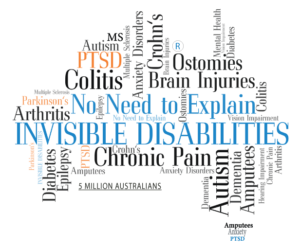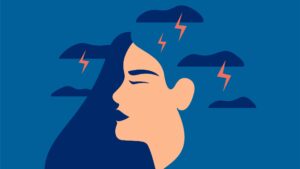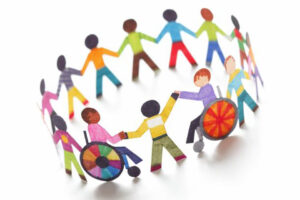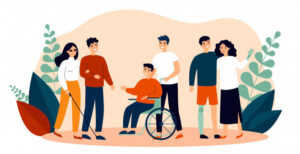Those with an invisible disability often face continual judgment from others.
Symptoms such as exhaustion and brain fog can lead to feelings of hostility, isolation, as well as helplessness.
Coping skills encompass lowering your intentions, picking your battles, and practicing self-compassion.
I didn’t give much attention to this problem until I experienced my stroke. Suddenly I was born with a brain injury, fatigue, anxiety, depression, chronic pain, and epilepsy. But as I attempted physically, I looked flawlessly fine to the outside world.
An invisible disability or illness is simply a medical and/or psychological situation that isn’t noticeable to others. Aside from the challenges of facing each day, one of the most impossible and often hurtful consequences is the lack of understanding from others. Those with invisible disabilities are frequently faced with comments, decisions, and rude questions. Some people may perceive us as lazy. The reality is that we are trying to deal with a condition(s) that leaves us feeling drained, mentally as well as physically.
Navigating Questions and Judgment from Others
Always feeling as though we need to prove that we indeed have several challenges can be frustrating and exhausting, particularly when many times we feel as though we’re running on empty. Understanding that we will probably face judgment or scorn when going into public can cause feelings of uncertainty. Often, I resisted leaving the house because it was just easier to stay home. If I’m at home, others don’t glimpse my battle; they don’t see my challenges. They don’t roll their eyes at me, call me stupid, push me out of the way, or affect the many other circumstances I have faced.

We repeatedly deal with a multitude of questions about our invisible disability or illness and this can be draining. These questions can induce us to question ourselves. Occasionally I let doubt get the better of me, and I wonder, Am I an imposter? When everyone determines it’s all in your head, it can make you question your fact.
If you are doubtful about your invisible disability, then this can cause you to resist treatment or not follow through with a treatment plan. This could have severe consequences. I doubted myself and withstood treatment for my recession. I proceeded to spiral downhill, and it eventually became so severe I had to be hospitalized for therapy.
Fatigue, Brain Fog, and Other Challenges
One of the enormous challenges many of us face is chronic suffering. It can be physical or mental as well. Numerous times, we are unable to complete tasks or contribute to activities because of exhaustion. This is frustrating as well as can cause feelings of anger. These are things we wish to do, but fatigue gives in the way. It is challenging to clarify to others, and they may pass decisions. Why are you being lazy? I frequently feel lazy myself, even though, intellectually, I realize this is a consequence of my spasm.


Brain fog is not a medical circumstance itself but rather a symptom of other medical conditions. It can deter with memory, clarity, concentration, comprehension, as well as the ability to concentrate. Living in steady pain, whether it be physical or psychological can have a debilitating impact on our daily lives. As with fatigue, it can cause anger and frustration as it prevents us from appreciating many of the activities that used to bring us joy. We may become isolated and feel unable as it deters the activities of daily life. Again, we can face ridicule and people who determine that it’s all in our heads. Even health care professionals may be dismissive and tag us as drug seekers.
It would be difficult to list all the challenges that those living with invisible disability or illnesses face; they are nearly limitless.
The Burden of Guilt
I’m sure I’m not the only one who has learned but you look fine to me. Listening to this from others can affect us to believe that it’s all our mistake. We can realize as though we are admitting those we care about below. I frequently beat myself up because I’m unable to work due to an invisible disability. I often ask for help and am unable to function at the level that others expect. Feeling like a responsibility or that we’re not accomplishing enough can lead to feelings of guilt. I find myself constantly confessing it for something that is totally out of my control. Even though intellectually we understand that none of this is our fault.


You may need to cancel or alter plans because of a flare-up or bad day. You may feel that you are letting your friends and family down, especially when you see the dissatisfaction in your children’s eyes when you are incapable to play with them.
Knowing how your invisible disability or illness is affecting your partner’s life can also cause feelings of guilt. Numerous times, I’ve said to my husband, You didn’t enroll for this. I feel as though I should be doing more, or I’m not trying hard sufficient, even though I understand this isn’t true.
Coping Strategies
Let go of intentions. They can often lead to disappointment.
Find support through friends, family, and groups.
Drop the guilt. It fulfills no purpose.
Seek professional help successfully govern your symptoms.
UNTOLD FACTS ABOUT SUZETTE QUINTANILLA’S, WEDDING FROM ‘SELENA: THE SERIES’
Experiment with actions that bring you joy.
Realize you can’t legislate others. Don’t allow anyone’s negativity to take you down.
Pick your battles. Assess whether it’s worth your energy.
Be kind to yourself.
Spread awareness: When able, inform others regarding life with an invisible disability/illness. Maybe, just maybe, you will open their eyes and help them memorize to be kinder and less critical. We can only hope!


The Challenges of Invisible Disability in Teens
When you think of living with a visible disability, at least some of the challenges of that disability seem apparent. But the challenges faced by ones who suffer from invisible disability aren’t as instantly obvious to people who don’t have those experiences.
If a person doesn’t look sick or disabled, do they face as many challenges as someone whose disability is more noticeable? Yes, they frequently do.
Take a glance at some of the challenges that invisible disability poses for citizens who reside with them.
Increased Scrutiny
When you see someone unpacking a wheelchair from their vehicle or having an invisible disability, you probably don’t think twice about their car being parked in an accessible parking space.
TESLA EMPLOYEES HAD NO PLACE TO SIT, AND NO PARKING SLOTS WHEN THEY RETURNED TO THE OFFICE
But someone with an invisible disability like fibromyalgia may not inevitably need a wheelchair, but may be unable to walk long distances and need available parking close to the building that they’re entering.
Even if you wouldn’t think to stop and question a person’s right to park in an accessible parking space, use a vulnerable bathroom stall, or use other accommodations meant for people who have an invisible disability, many people do question those whose disabilities are not instantly obvious.


Anyone who has an invisible disability may be denied access to accommodations they need by people who don’t believe them, and they may also be reached by random strangers who question whether they need an accommodation that they’re using.
This heightened scrutiny can be upsetting, dangerous s, and frightening for the people who have to deal with it. It’s emotionally draining to be frequently disbelieved and challenged regarding one’s own experience.

